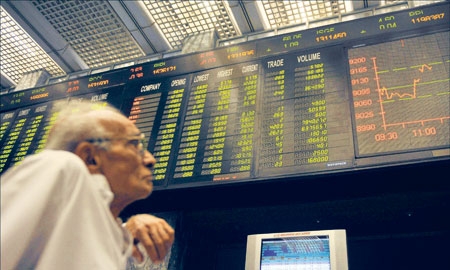Pakistan’s equity markets have hardly been quiet these past five years. In 2009 there was great scepticism after the market opened to lower checks from its fourth-month close. The scepticism lasted well into 2012, but with general elections deemed free and fair in May 2013, optimism has never been higher.
The bull market is not just the result of a first-ever peaceful handover of political power. The Karachi Stock Exchange has also been boosted by global trends: as BRIC economies slow down, investors are being driven to new markets. The soaring growth of the KSE in the first half of 2013 – it rose by 40 per cent in local currency terms – was only outperformed by the NIKKEI in the same period. Moreover, over the past three years, 22 KSE-100 companies have enjoyed average annual returns of more than 50 per cent, while the KSE-100 index rose by nearly 50 per cent last year, making it the fifth best performing stock index in the world. In addition, 25 of these 100 top stocks garnered total returns above 100 per cent last year.
“Pakistan has a vibrantly expanding middle class and with the consistent growth in per capita incomes, the change in consumption patterns will open significant areas for investment” Aqueel Karim Dhedhi
Chairman of AKD Securities |
“Over the last 12 years, the Pakistani market has given an average per year return of 36 per cent and the rupee has depreciated by 5 per cent on average. So Pakistan’s capital market has given an annual return of 31 per cent in dollar terms” Arif Habib, CEO of Arif Habib Group |
A third factor in the extreme growth of the exchange is a 2012 amnesty policy that has allowed investors to buy shares – no questions asked. The aim? To encourage people with undocumented funds to invest in the market, bringing cash into the formal economy and within reach of Pakistan’s tax authorities. Currently, only 3 per cent of the population pays taxes. The amnesty lasts until June 2014.
Two companies playing a key role in the unprecedented rise of the exchange are the
Arif Habib Corporation Limited (
AHCL) and
AKD Securities Ltd (
AKD).
Arif Habib Securities has been one of the best-performing and most profitable brokerage houses in the country, and is the flagship company of the Arif Habib Group, which celebrates its 10-year anniversary next year. The company has a diversified portfolio across sectors including chemical and fertilisers, financial services, construction materials, industrial metals, dairy farming and others. Its success can in part be attributed to the generous percentage of cash dividend and bonus issues that CEO Arif Habib regularly announces.
While security concerns have long kept foreign investors from tapping Pakistan’s potential, that is changing, says Mr Habib, who has also served as the Karachi Stock Exchange’s elected President and Chairman six times.
“Every sector in Pakistan presents huge investment opportunities, be it agriculture, industry, infrastructure development or trading. Recently, some retail initiatives have also been taken and the response towards them has been phenomenal. In this regard, I would say that Pakistan offers huge opportunities for investors. Many economies are at saturation level, but Pakistan has a need for investment in every sector, and there is demand for it.”
The key is to be a superior asset manager, while keeping risk – inherent in an emerging economy like Pakistan’s – at an acceptable level.
“We understand Pakistan’s bureaucracy system so we have very close and strong relationships with policymakers as well. We can contribute in helping to opening policymakers’ doors and hearing out foreign investors’ proposals,” says Mr Habib.
“Foreign investors are very strong in terms of technology and innovations but we can partner with them and look after the local side of their businesses – fundraising, the capital markets, regulators, policy makers, etc. We can also identify good local partners, who also come to us for advice, and ask us to show them investment opportunities, where they can partner with us or with international players.”
The AKD Group is another company playing a key role on the exchange. Led by Aqueel Karim Dhedhi, the group – started in 1947 by his late father – operates in financial services, telecom, infrastructure, manufacturing and natural resources. AKD Securities Ltd also provides equity brokerage, economic andsecurities research, investment banking and financial advisory services (and accounts for more than 6 per cent of the average daily value of the Karachi Stock Exchange).
Mr Dhedhi strongly believes in the ‘first mover advantage’. His company was the first to launch a state-of-the-art online stock trading service in Pakistan and remains the leader in this arena today. “We made it easier for people to come into Pakistan and invest here without any difficulties of following certain procedures, rules and regulations. They can now easily invest in securities through online means irrespective of the country they are domiciled in,” says AKD’s Chairman.
With its core business in securities and construction, he is forward-looking when it comes to unexpected areas of growth in Pakistan. Take land and housing, as just one example.
“Even now we think, at the moment, the real estate sector here in Pakistan has not exactly been as explored as it could be or has the capacity to be. Here housing is not even 1 per cent mortgaged so there is still hope and a lot of scope in this sector in terms of availing opportunity,” explains Mr Dhedhi.

0 COMMENTS